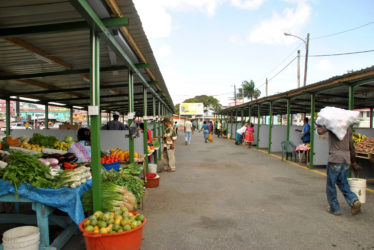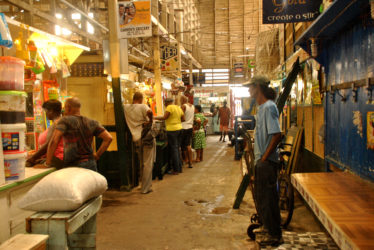These days, more than 300 vendors ply their trade on the streets and pavements of Georgetown. They are more than part of the urban commercial landscape; they are part of the capital’s history, many, perhaps most of them, being the children and in some instances the grandchildren of the original hardy breed, pressed into that option by the inability to find alternative employment. There are instances in which successive members of the same family have toiled for generations literally at the same spot or on the same corner.
Not much has changed for these intrepid traders over the years. Their presence may have added a different dimension to the colour of urban life, but their circumstance, as a business group that remains on the periphery has not changed.
Over time, new, arguably more convivial trading spaces have sprung up. Merriman Mall, for example, comes to mind. Once you dig deeper into the business of vending, however, you make some surprising discoveries. You discover, for example, that the practice is, to a large extent, illegal and inevitably, poorly regulated. The vendors, City Hall readily concedes, have few responsibilities and possess little or no rights beyond those ceded to them by the goodwill of the municipality or central government.

The relationship between the vendors and the municipal police who superintend the trading activities has been an uneasy one. The vendors complain of abuse, exploitation and of being pressed into cooperating in rackets that allow them to pay for the privilege of trading unmolested. The municipality says that its effective management of the city and more particularly, the trading spaces demand that the activities of the traders be tightly managed.
In the absence of regulations that protect them some of the vendors have, over the years, simply endured their situation. Unlike the established trading entities there are no business support organizations to speak for them.
Town Clerk Royston King has told this newspaper that, in effect, there is no legal provision for street vendors.
“The law provides for the establishment and management of markets by the Council and it also provides for the prohibition of trespass on roads, pavements and parapets. Council has the right to remove any encumbrance at any time but we recognize that for many this is a significant economic activity.”
King speaks with the law on his side. The Municipal and District Council Act, Chapter 28:01, which governs operations at City Hall, details the powers of the Council.

Section 302 Article 31(d) pronounces on the Council’s responsibility to “establish, erect, maintain, let, control and manage markets and market buildings, shops, stalls and stands and to control the occupation thereof,” while Article 25 affords the Council the prerogative to “prohibit trespass in alleyways and the encumbering of public and Council roads and the parapets and of pavements.”
On the sides of both the municipality and the traders, there are issues to be taken account of. On the vendors’ side, and King himself concedes this, their pursuit has become an increasingly significant economic activity. As unemployment, particularly amongst the less well-educated climbs, increasing numbers of individuals and families across several communities must depend on street vending to survive. Managing the growing army of urban street vendors with all that that implies, King says, is the municipality’s challenge.
Melissa Roberts is eminently qualified to weigh in on the subject of urban street vending. That has been her family’s livelihood for 35 years. Thirty of those years have been spent on Merriman Mall. “I was here when we moved from the John Ford car park to Merriman’s Mall. My mother was a vendor at Bourda Market. I grew up around vending; it’s how I survived. I’ve never had another job,” Roberts told Stabroek Business. She says that she has always tried to “work with” the Council but that things are changing. Their recent actions, she says, have created feelings of frustration and insecurity. She no longer feels secure in pursuing her livelihood.
“They are being disrespectful. Every time we try to engage them we are being disrespected. They promised us better facilities when they moved us but all we have now is horse stables,” she says.
Robert is one of the almost 40 vendors who have recently had to endure interventions by City Hall. Those vendors were first asked to condense their operations to the Mall area east of the Cummings Street in order to facilitate the construction of a parking lot on the western section. After that, the Council imposed a one-week suspension on their trading activities as a penalty for what it determined was the insanitary environment in which they plied their trade.
On the first day of their suspension King told reporters that they were being permanently removed from the stretch. The next day he issued a clarification. What Council wanted, he said, was a circumstance that ensured enhanced sanitary standards in the trading area.
After that the vendors were temporarily relocated to Orange Walk and efforts began to construct “suitable standardized stalls” on the mall, between Cummings Street and Orange Walk.
The vendors’ return to their ‘new look’ stalls was attended by transformed trading conditions. They must now ply their trade within the confines 8ft x 4ft stalls, a space which they say is altogether inadequate. Vendors who had previously operated from spaces the equivalent of eight pallets are now being required to trade from spaces equivalent to the size of a single pallet.
Roberts points out that despite the restrictions there are several empty stalls in the section. “They have you completely cramped and yet they have empty stalls. They claim they raised the daily fee because they were providing better facilities but I don’t know what those facilities are,” she said.
If City Hall appears reluctant to admit it, the administration there appears preoccupied with what it perceives to be the need to win the credit for what has been the long talked-about requisite—to ‘clean up’ the city, a task which, presumably, has become more urgent with the imminent arrival of May 26, the date of the 50th anniversary of the country’s independence. Over the years, much of the public criticism of the state of the capital has centred around conditions in the vicinity of the municipal markets. For City Hall, therefore, the Bourda Market area is a soft target for its clean-up initiative.
At the same time there is an argument that targeting the vendors is a revenue issue. This newspaper has learnt that City Hall had originally “negotiated” with the Merriman Mall vendors to have them pay a daily trading fee of $1,500 for operating in a space which had been upgraded with lighting facilities, running water, washrooms and security. The vendors resisted and the fee was lowered to $1,000 a day. The vendors, it seems, have taken issue with what they say is the arbitrary way in which decisions are made and implemented.
“City Hall can put you here today, move you tomorrow. Charge for facilities and don’t give you anything and there is nothing you can do about it,” Roberts says.
A new relationship would appear to be evolving between City Hall and Georgetown’s urban vendors. It is, to say the least, an uneasy one, characterized by intensified competition for trading spaces, heightened municipal policing on street vending and growing pressures associated with official insistence on higher environmental standards. Still, there is no indication that it is any closer to fashioning laws that ensure the vendors are better protected than they are at this time.





